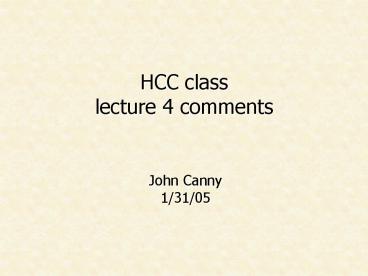HCC class lecture 4 comments - PowerPoint PPT Presentation
1 / 15
Title:
HCC class lecture 4 comments
Description:
... principles emphasizing the role of social forces and history on the individual. ... of social phenomena through their history and (social, political) context. ... – PowerPoint PPT presentation
Number of Views:70
Avg rating:3.0/5.0
Title: HCC class lecture 4 comments
1
HCC classlecture 4 comments
John Canny1/31/05
2
Administrivia
3
Vygotsky - bio
- Early life was extraordinary mastered fine
arts, especially literature, philosophy, art and
law. - This continued throughout his life. Later he
worked closely with Eisenstein (film), and
Stanislawsky (method acting) in his work on
defectology. - Very much a pragmatist in philosophy. Well
acquainted with the works of the American
pragmatists Peirce and William James. He applied
his ideas to the practice of education, etc.
4
Vygotsky - bio
- 1917 The year of the first post-revolutionary
provisional government in Russia, which
abolished the death penalty and fought for civil
liberties - overthrown by the Bolsheviks. - Vygotsky takes on several critical social
challenges - Education Much of the country is un-schooled and
illiterate - Mental health There are no institutions to deal
with mental health problems, esp. in children. - Language How to unite a country that has dozens
of former national languages.
5
Vygotsky - bio
- He starts to develop theories of development and
language based on Marxist principles
emphasizing the role of social forces and history
on the individual. - Vygotsky recruits some extraordinary students
- Luria does pioneering work in cultural and
neuro-psychology - Leontev develops Activity theory.
6
Genetic domains
- Marx emphasized understanding of social phenomena
through their history and (social, political)
context. Vygotsky considered history on 4
planes - Ontogenesis Psychological development of the
individual. - Socio-historical Development of cultural
practices in a society. - Micro-genesis Development of single
competencies. - Phylogenesis Evolution of the human species.
- His main contribution was the mutual influence of
the first two.
7
ZPD
- The Zone of Proximal Development the set of
tasks the child can do with help from a more
advanced peer or adult. Children learn rapidly
here.
8
Mediation
- Vygotsky paid much attention to mediation
childrens use of tools to achieve a task. His
perspective is very close to a phenomenological
one. - He also treated language as a mediational tool.
This is very consistent with Piagets findings.
9
Internalization
- Vygotskys viewed development as starting on the
social (or socio-historical) plane and moving to
the psychological plane (individual development).
- Language is first encountered by the child in the
social plane, but is gradually internalized as
the child masters new concepts. - This process is also called appropriation
(Rogoff).
10
Self-regulation and private speech
- Private speech is a fascinating phenomenon in
young children in which they spontaneously voice
commands, descriptions and reminders to
themselves. - In Vygotskys hands, private speech is a powerful
clue to the linguistic character of human
thought.
11
Discussion topic 1
- Can you think of examples where you have used
private speech for a new task? - More generally, how much of your own thought is
explicitly linguistic? - Is it difficult to answer this question? If so,
why?
12
Discussion topic 2
- Discuss the proposition language is a tool?
What are some differences and similarities
between language and other types of tool?
13
Discussion topics
- Can you think of examples where you have used
private speech for a new task? More generally,
how much of your own thought is explicitly
linguistic? - Discuss the proposition language is a tool?
What are some differences and similarities
between language and other types of tool?
14
Reading for next time
- James Wertschs introduction to Vygotsky. More
complete but more challenging that this reading.
Volunteer?
15
(No Transcript)































